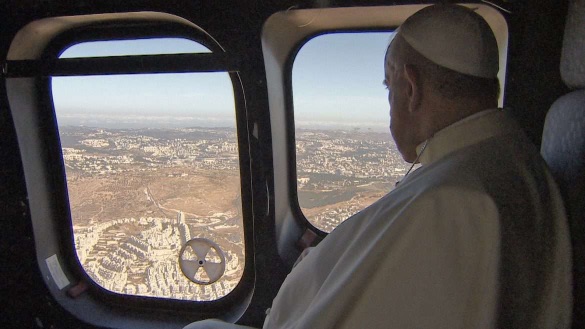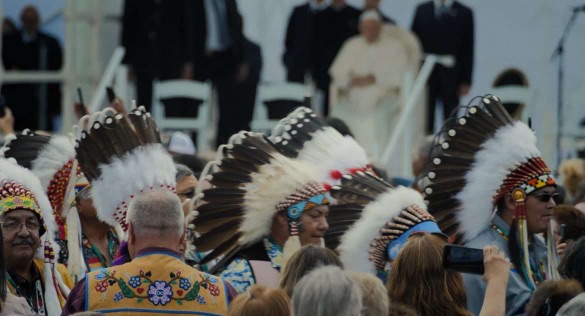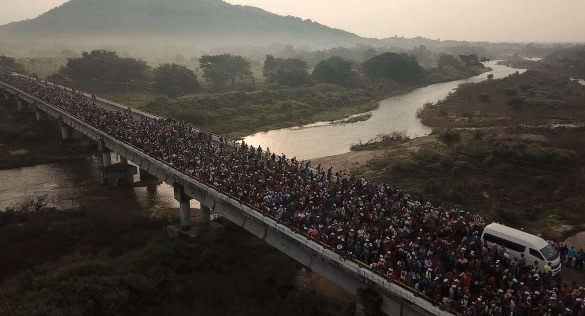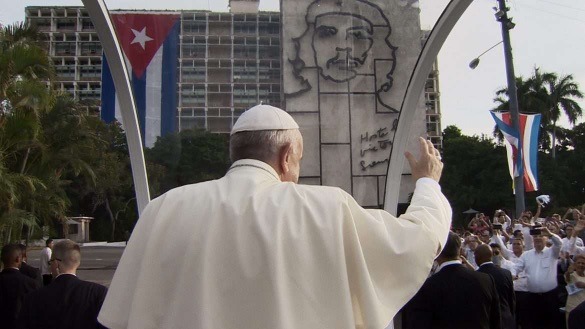Presented as part of the latest Venice International Film Festival, Gianfranco Rosi’s “In viaggio” tells the nine years of Bergoglio’s pontificate through his travels around the world
Maybe this documentary could have competed and maybe it could have won. In a historical moment marked by the possibility of a third world conflict, with the use of nuclear weapons, and by the possibility of new future wars even more serious than the one in progress in Ukraine, a documentary on the pilgrimages of one of the most morally influential men on the Terra could have told us one thing: that cinema is great when it can directly express the highest ideas of man. Which are always the same: peace, mutual understanding, forgiveness, harmony, universal love, gratitude, brotherhood. Gianfranco Rosiformerly Leone d’Oro in 2013 with Sacred GRAhe knows how to do it by following the travels of Pope francesco between 2014 and today.

PORTRAIT OF A POPE. “IN VIAGGIO” BY GIANFRANCO ROSI
Rosi’s documentary Travelling it is a simple, immediate portrait. His room discreetly follows Francesco and listens to him. Sometimes he stops on the mute expressions of the characters he meets, revealing the difficulties inherent in every human and cultural encounter, as well as religious and political. But there are also words, some phrases as heavy as mountains, when it is Peter’s vicar who says them. And all this contributes to defining the portrait of a pope who is redesigning the figure and role of a two-thousand-year-old institution by transforming the keeper of a place (the one and indivisible Catholic Church) into a pilgrim of the (Christian) spirit equipped with an arsenal of wisdom, of (perhaps) unprecedented openness. To the Russian Orthodox Pope Kirill (the one who religiously supports Putin today), Francis says, now a few years ago: “Let the theologians fight, we are two bishops”, indicating that the way of conciliation does not pass through philosophical subtleties. To the inmates of Mexico he says: “Do not ask the reason for what happens but what is its purpose”, introducing them suddenly into a divine plan that does not stop to brood on sin (original and otherwise) but becomes a message of salvation. These are phrases that we ourselves would say to a friend of ours in a crisis of cosmic pessimism. In Rome, in 2020, in the rainy solitude of a St. Peter’s Square hit by the pandemic, he says: “The whole is greater than the sum of the parts”, quoting an old adage. In Cuba, on the other hand, aware of the delicacy of the situation, he argues that if one can be without freedom, one cannot be without dignity. A phrase valid for all dictatorships and totalitarianisms.

THE DIFFICULT “PROFESSION” OF THE POPE
It would be easy to accuse such speeches of “hypocrisy”, but in reality Francis remains a man who finds himself having to apologize for centuries of errors and horrors. Rosi’s film helps to better understand the need for a modern Pope to move with extreme caution through the dangers of real-time global communication that easily triggers diplomatic frictions between entire cultures. As happens in his visit to Armenia in 2016, when he talks about the Armenian genocide as the first of the great genocides of the 20th century. Erdogan’s Turkey does not approve and the Holy Father is forced to clarify his thoughts. As for a composer of symphonies, every saying of him must be in harmony with the whole, but in a world where everything is in perennial war. And then the Pope goes to the root (one of the roots) of evil: that slavery towards the new god of money that he repeats in various countries he visits. And from many of them he condemns without appeal all arms manufacturers. There are no good arms manufacturers, just as there are no good or just wars. And it strikes the reception with military parades against a man who is seen more easily as a political leader than as a spiritual authority, which denounces not only a form of secularization of the institution of the Church, but above all a form of loss. of spirituality by a world apparently standardized on materialistic values and the instincts of oppression.

THE JOURNEYS OF POPE FRANCIS
In the United Arab Emirates, in 2019, cannons fire as the tricolor arrows cross the sky. Pope Francis meets the crown prince on the eighth centenary of the meeting between Francis of Assisi and the sultan. The scenario changes in Madagascar, inside a sort of ecovillage built between smiles and songs by a student in theology of Pope Francis. Here he tells him: “Poverty is not a fatality”. But then comes the trip to Canada in 2022, and Francis’s suffered and repeated apologies that follow the “discovery” of the thousands of children buried under residential schools who have supported a ferocious assimilation policy. Francis condemns the psychic and physical, verbal and spiritual abuses. He asks indigenous peoples forgiveness for the cultural destruction carried out by a church without mercy or tolerance and devoid of the sense of those human rights that autocracies and the most backward parts of Western societies still struggle to recognize.
“IN VIAGGIO” BY GIANFRANCO ROSI. REFLECTIONS
At the end of the documentary, one could count the people that Francesco hugged and kissed and then multiply them by the thousands of hours shot by Gianfranco Rosi over the years; and then multiply them again for the decades of life of Francis. This is the only way to get an idea of the amount of spiritual love that a single human being is capable of. A moving thought. Just as it is moving to see the tired Holy Father getting up with difficulty to follow yet another celebration, yet another encounter, yet another attempt at peace profuse in a life as a globe trotter. After all, if Jesus had been born in this historical moment, what would his preaching be like? Would he move on foot to Galilee or would he rather take the plane reaching every corner of the world, from Africa to Latin America, from Japan to the United Arab Emirates? For Pope Francis the answer is clear and Rosi shows it clearly. And finally, among the credits, here are the people indicated by the Pope as examples to follow. They are also excellent reading tips, for those who want: Dorothy Day, Dalai Lama, Thomas Merton, Martin Luther King, President Lincoln.
– Nicola Davide Angerame
The travels of Pope Francis told in the new film by Gianfranco Rosi

